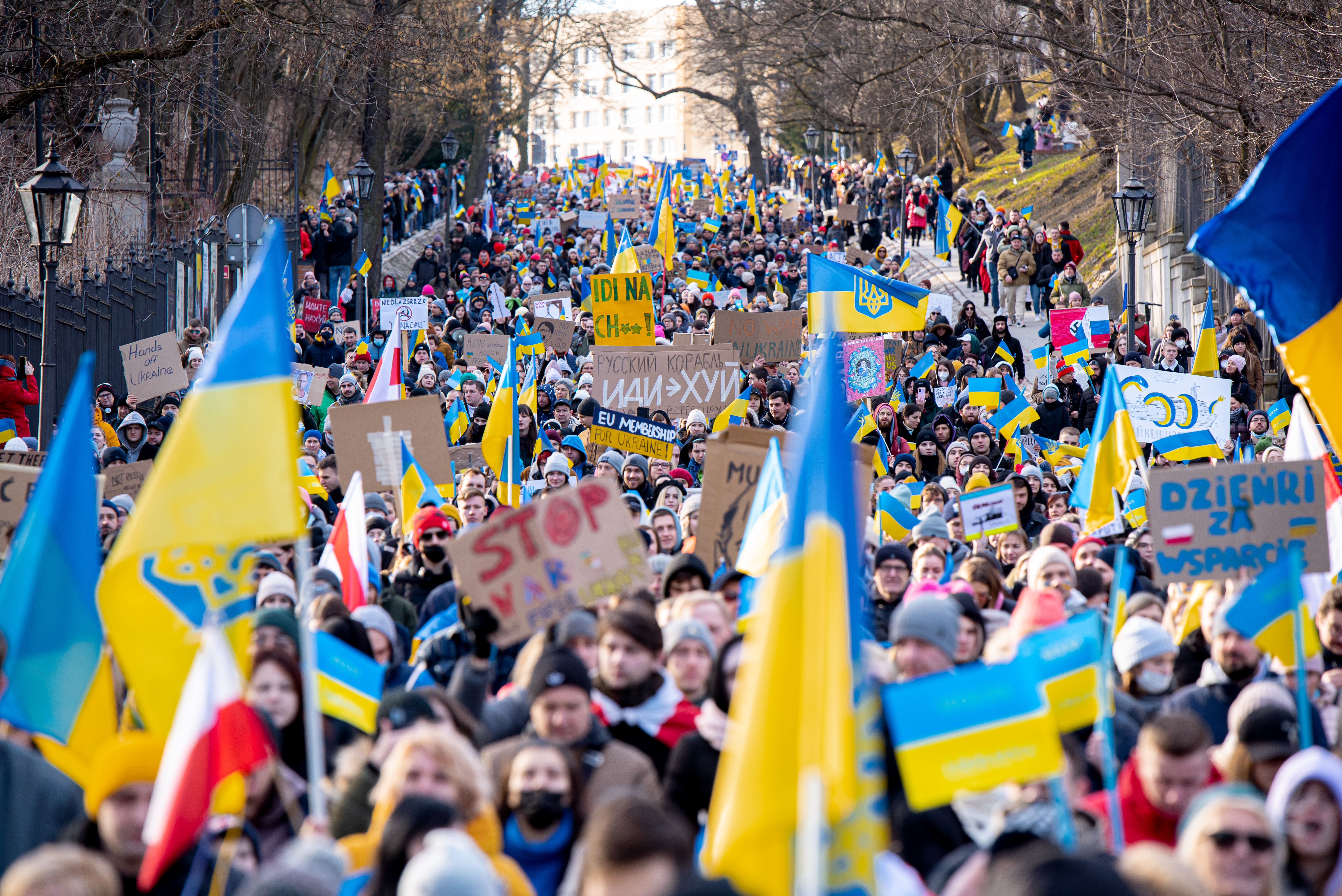War In Europe
Russian invasion on Ukraine: Impact on Africa

Warsaw, February 26, 2022: Protest against war in Ukraine and Russia's invasion. People marching with flags at demonstration in support of Ukraine.
©Shutterstock
When Russia invaded Ukraine on February 24, the effects immediately rippled out around the world. In sub-Saharan Africa, the conflict has thus far been felt most acutely as a commodities crisis, with prices of key goods imported from Russia and Ukraine already beginning to spike. But there are also diplomatic tensions brewing over the treatment of African students in Ukraine, as well as how African countries position themselves in relation to a conflict led by a country with deep historical ties to the region.
In many ways, Russia and Ukraine are the world’s breadbasket. The two nations are the world’s first and fifth largest exporters of wheat, respectively, together furnishing about 30 percent of the world’s supply. Ukraine, meanwhile, accounts for 40 percent of the world’s sunflower oil exports and 14 percent of its corn exports. Many sub-Saharan African countries, in turn, are major wheat, corn, and cooking oil importers, heavily reliant on exports from countries like Russia and Ukraine to maintain their food security. In east Africa, for instance, 84 percent of the wheat consumed is imported, and 90 percent of those imports come from Russia and Ukraine.
The war could have both short and long term effects on those imports. In the short term, wheat prices have already skyrocketed globally – hitting more than $13 a bushel in March 2022, up from $8 a bushel a month earlier, due to both port closures in Ukraine and longer-term speculation about disruptions to supplies from the two countries. With many sub-Saharan African countries already facing inflation of staple food prices due to conflict, drought, and economic crisis, the rising global cost of wheat could push food prices in those countries higher. And rising food costs in the region don’t just affect consumers’ pockets, they “sometimes bring people into the streets,” noted Steven Gruzd, a Russia expert and foreign policy analyst at the South Africa Institute of International Affairs in Johannesburg, in a recent interview with Voice of America. That is to say, many of the region’s recent political crises – key among them the 2018 revolution in Sudan – began as protests over the price of bread. Meanwhile, the spiking global price of oil since the start of the war is likely to be felt in complicated ways in sub-Saharan Africa. For many countries, including major continental economies like South Africa, it is likely to bring rising costs to consumers for petrol and electricity. Oil exporting countries like Sudan, South Sudan, and Angola, meanwhile, could see an economic boon.
One of the most immediate ways the war has been felt, however, has been the treatment of African students fleeing Ukraine. Some 20 percent of foreign university students in Ukraine are African, and many reported facing hostility, aggression, and outright racism as they fled the conflict over the last three weeks. Students reported being pushed to the back of border queues or stopped from boarding trains or buses by officials demanding that Ukrainians be allowed to cross first. The African Union has decried their mistreatment, writing in a statement that the treatment was “shockingly racist and in breach of international law.”
Still, in spite of the diplomatic row caused by the exodus of students, the war has compelled many sub-Saharan African countries to strengthen diplomatic alliances with either Russia or the West, many of which date back to the Cold War. This is illustrated by the lines along which African countries voted in the recent United Nations General Assembly resolution condemning Russian aggression in Ukraine. Among Africa’s 54 countries were 28 votes in favour of the resolution, 16 abstentions, 1 vote against, and 9 countries that did not vote. Among the 28 “yes” votes were many of the continent’s leading democracies, including Botswana, Ghana, Cabo Verde, Nigeria, and Kenya. In an op-ed for The Conversation, political analyst Joseph Siegle termed their collective support a “remarkable rebuke of Moscow from a continent where many African leaders’ world-views are shaped by a posture of non-alignment, raw legacies from the Cold War, African diplomatic politesse, and a desire to remain neutral in Great Power rivalries.” Still, many countries in sub-Saharan Africa did abstain. Among them were countries like the Central African Republic, Mali, and Sudan — whose military regimes are directly propped up by Moscow — and countries like Angola, Burundi, Guinea, and Zimbabwe that receive Russian aid in the form of arms and political disinformation campaigns. Still others, like South Africa, drew on a long history of political non-alignment in their abstention.
In a speech to the UN Security Council that has since gone viral, Kenya’s ambassador to the United Nations, Martin Kimani, explained how the stakes of the war felt deeply familiar to many on his continent. “Kenya, and almost every African country, was birthed by the ending of empire,” Kimani said. “Our borders… were drawn in the distant colonial metropoles of London, Paris, and Lisbon with no regard for the ancient nations that they cleaved apart… At independence, had we chosen to pursue states on the basis of ethnic, racial, or religious homogeneity, we would still be waging bloody wars these many decades later.”
The article is written by freelance journalist Ryan Lenora Brown on behalf of the Friedrich Naumann Foundation for Freedom in sub-Saharan Africa.
